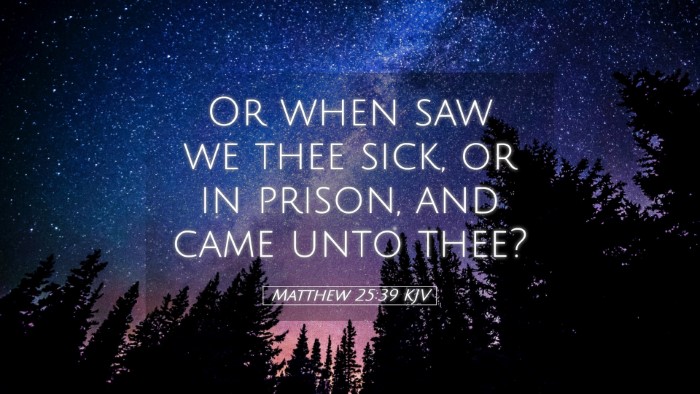Matthew 25:39 - Commentary Summary
Verse Context: Matthew 25:39 states, "And when did we see you sick or in prison and come to you?" This verse is part of the parable of the sheep and the goats, where Jesus illustrates the final judgment and the importance of acts of compassion towards others as a reflection of one's faith.
Introduction to the Commentary
This passage invites profound reflections for pastors and theologians alike. It emphasizes Christian ethics revolving around charity and compassion as fundamental to the faith. The following analysis synthesizes perspectives from key public domain commentaries.
Exegesis of the Verse
Matthew Henry: Matthew Henry highlights the principle underlying this verse, focusing on the accountability of every believer to care for those in need. He stresses that our actions towards the least of society resonate with our love for Christ Himself. In both the physical suffering of individuals, such as the sick and imprisoned, and spiritual misery, the actions we take manifest our faith.
Albert Barnes: Barnes emphasizes the social responsibility of Christians as inherent to their faith. He expounds that seeing someone in need and failing to act is a severe indictment against one’s professed beliefs. The inquiry about when they did not aid those in distress serves as a poignant reminder of the imminent judgment that awaits individuals based on their merciful acts.
Adam Clarke: Clarke provides a theological underpinning by framing this verse within the context of the entire teaching of Jesus regarding love and brotherhood. He relates this passage to the concept of one’s neighbor and broadens the understanding of ‘sick’ and ‘in prison’ to include all humanity, thus inviting congregants to a more extensive engagement with social justice.
Theological Implications
This verse is pivotal in exploring the Christian response to suffering and social justice. The analysis reveals several theological implications:
- Soteriology: The passage hints at the relationship between faith and works, suggesting that genuine faith is demonstrated through compassion.
- Ecclesiology: It calls to attention the nature of the Church as a community witnessing Christ's love through deeds.
- Eschatology: The parable strongly connects to the doctrine of final judgment, urging believers to reflect on their actions as indicative of their ultimate standing before God.
Practical Applications
For contemporary application, pastors and church leaders can draw several lessons:
- Fostering Compassion: Encourage congregations to actively engage in acts of service, showcasing that faith without works is dead (James 2:26).
- Community Outreach: Organize ministries that address the needs of the sick and imprisoned, embodying the very essence of Christ’s teachings.
- Personal Reflection: Promote introspection among believers on how they respond to needs around them, aligning their actions with Christ’s directive to love.
Conclusion
The insights gleaned from Matthew Henry, Albert Barnes, and Adam Clarke on Matthew 25:39 allow for a multidimensional understanding of the text that is both compelling and challenging. As Christian leaders take to heart the implications of caring for those in need, they are reminded that our treatment of the least of these is the measure of our true allegiance to Christ. This commentary stands as a testament to the critical role that empathy plays within the Christian life, beckoning believers towards a transformative faith that acts.


